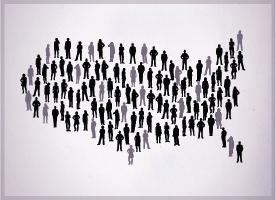Pew Survey Reveals Religion

By Jeff Satterwhite
A new survey on American religiosity conducted by the Pew Forum on Religion & Public Life revealed that about one-in-five adults in America now self-identify as “religiously unaffiliated.” The rapidly rising level of “nones” includes 33 million people who say they have no particular religious affiliation and 13 million people who now identify as atheists or agnostics. Such identification with non-affiliation continues a trend seen over the last few years, reflecting an almost 5% increase since 2007 alone. This trend towards non-affiliation, particularly in certain demographic groups, suggests a changing perception regarding religion’s singular claim to morality.
While the rise in the unaffiliated does not automatically reflect a shift in theological beliefs, the percentage of Americans saying that they “never doubt the existence of God” has dropped 8% since 2002. The growth in the unaffiliated is clearly coming at the expense of Protestants, whose decline mirrors the unaffiliated increase. The generational gap in the findings is also quite striking. Thirty-two percent of young adults 18-29 years of age now identify themselves as unaffiliated, in contrast to only 9% of those age 65 and over. The Pew Forum describes this as a “softening” trend in religious commitment, especially among young people, that has continued in recent decades. The loosening of religious commitment among young adults seems to stretch to all regions of the country, perhaps slightly less so in the South. These trends among younger Americans are leading to rapid growth in groups like the Secular Student Alliance.
While all of these findings are interesting, perhaps the key attitudes revealing a cultural shift can be found in the section of the study focused on organized religion, morality, and politics. While both affiliated and unaffiliated strongly agree on religion’s positive role in meeting social and community needs, the two groups diverged drastically regarding religion’s role in strengthening morality. Only 52% of the unaffiliated and 35% of atheists and agnostics agreed with the idea that churches and other religious organizations protect and strengthen morality in society. Approximately half of unaffiliated people felt that organized religion is too concerned with money and power, too focused on rules, and too involved with politics, while being ineffective at solving important social problems.
The historian and sociologist of religion Randall Balmer recently described one of the public functions of religion in American society as being a “proxy for morality” in evaluating the character of public figures. Identification with religion has been one way politicians and other public figures have identified themselves as moral and ethical throughout American history. By claiming the mantle of being a “strong Christian” who attends church regularly, one gains social status as inherently ethical in the view of the American public. The close connection between religious identification and moral evaluation has been one distinctive aspect of American public religiosity in contrast to secularizing societies in Europe. This connection between morality and religiosity serves as a subconscious privileged cultural narrative running through much of American public discourse, frequently demonizing secular Americans in the process.
The Pew Forum study seems to show that the perception of religiosity as a moral proxy is beginning to change in American culture. Unaffiliated individuals are moving away from the view that organized religion is a path to stronger morality, and atheists and agnostics are strongly rejecting this view. In the midst of this paradigm shift, two-thirds of Americans see religion as losing its public influence on American society. Both the unaffiliated and the affiliated share this view, but they diverge sharply on the positive or negative nature of the trend. Adults who are unaffiliated with religion seem to be moving sharply away from the idea that being religious means being inherently moral. In this space, the nature of moral identity is being challenged and redefined. The non-religious are overwhelmingly not seeking religious affiliation, partly due to the loosening grip of religious identity in labeling moral character in American culture.
Among sociologists of religion, the debate about secularization and American society has continued over the past several decades while America has resisted the trend of European countries toward rapid secularization. Sociologists have hastened to explain why America continues in its deep religiosity as Europe shifts, overwhelmingly concluding that America will remain deeply religious and not secularize in the way that Europe has. Perhaps this will hold true. Religious institutions in American society have thrived in the vibrant cultural tradition of religious freedom and competition. However, the possibility also exists that we may be seeing the beginnings of a new secularizing trend in American culture. While the general feeling toward religiosity among the unaffiliated may be more apathy than antipathy, the apparent rapid disillusionment with American public religion may indicate changing political attitudes that have a profound effect on American religious institutions. Younger people are seeing less of a need for religious involvement and connection to religious institutions. This shift is also reflected in more liberal moral views among young people, including swiftly growing support for same-sex marriage.
This important study from the Pew Forum illuminates some interesting changes in American demographics and has profound implications for efforts to promote secular humanism in American society. The findings suggest that even as the culture warriors of the Religious Right continue to fervently call for political action in the face of progressive social change, younger generations are tiring of the cultural influence of public religion. A clearly articulated secular ethics grounded in publicly accessible values of reason and the common good can appeal to these young adults who are increasingly skeptical of religious institutions.
Jeff Satterwhite is a doctoral candidate (ABD) in Religious Studies at the University of Denver and Iliff School of Theology studying the Evangelical Right’s influence in American politics. He is a speaker, writer, consultant, and former minister (member of the Clergy Project) who resides in Denver, Colorado.
